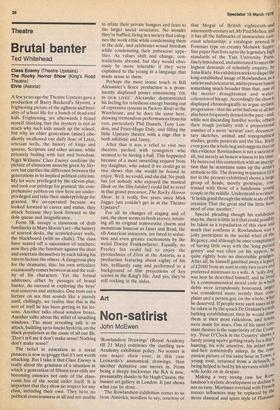Theatre
Brutal banter
Ted Whitehead
Class Enemy (Theatre Upstairs) The Rocky Horror Show (King's Road Theatre) Elvis (Astoria)
A few years ago the Theatre Upstairs gave a production of Barry Reckord's Skyvers, a
frightening picture of the ugliness and brut ality of school life for a bunch of dead-end kids. Frightening, yet afterwards I found myself thinking that the mystery is not so much why such kids smash up the school, but why an older generation (mine) obe diently swallowed our daily dose of Latin, artesian wells, the history of kings and queens, Scripture and other arcana, while privately boiling with lust and boredom.
Nigel Williams' Class Enemy confirms the picture of classroom anarchy given by Sky
vers but clarifies the difference between the generations in its implied political criticism. My lot were privileged by the eleven-plus; and took our privlege for granted: the com prehensive yobbos on view here are underprivileged and take their underprivilege for granted. We co-operated because we looked forward to career and status, they attack because they look forward to the dole queue and insignificance.
Form 5K occupy a classroom of drab familiarity in Mary Moore's set —the battery of scarred desks, the scrawled-over walls, the blackboard (with no chalk). The class have scared off a succession of teachers; now they pile the furniture against the door and entertain themselves by each taking his turn to lecture the others. A dangerous ploy for the dramatist, this: his own articulacy occasionally comes between us and the reality of his characters. Yet the formal addresses, offset by passages of brutal banter, do succeed in exploring the boys' real concerns and attitudes. One trots out a lecture on sex that sounds like a parody until, chillingly, we realise that this is the sort of stuff he has been getting in his lessons. Another talks about window boxes. Another talks about the relief of smashing windows. The most revealing talk is an attack, building up to fascist hysteria, on the black population as the cause of all our ills. 'Don't tell me it don't make sense! Nothing don't make sense!'
The belief in education as a social panacea is now so groggy that it's not worth attacking. But I take it that Class Enemy is really about the grimness of a situation in which a generation of fifteen-year-olds are becoming enemies not only of the classroom but of the social order itself. It is important that they show no respect for any class, including their own. They have no political consciousness at all and are unable to relate their private hungers and fears to the larger social structures. No wonder they're baffled, living in a society that eulogises the work ethic while condemning them to the dole, and celebrates sexual freedom while condemning their pubescent appetites. As values shift and change, contradictions abound, but they would obviously be more tolerable if they were explained to the young in a language that made sense to them.
Perhaps the most ironic touch in Bill Alexander's fierce production is a prominently displayed poster announcing 'OIL IN OUR LIVES'. Alexander demonstrated his feeling for rebellious energy busting out of repressive systems in Factory Birds at the Warehouse, and he does the same here, drawing tremendous performances from his cast, particularly Phil Daniels, Tony London, and Peter-Hugo Daly, and filling the little Upstairs theatre with a rage that is both nihilistic and funny.
After that it was a relief to visit two theatres packed with youngsters who seemed to be having a ball. This happened because of a most unsettling request from my daughter, who asked if we could go to two shows that she would be bound to enjoy. Well, we could, and she did. No punk fan (or nobody who enjoyed the musical Sleak or the film Jubilee) could fail to revel in that grand precursor, The Rocky Horror Show. Is it really five years since Mick Jagger just couldn't get in at the Theatre Upstairs?
For all its changes of staging and of cast, the show seems as fresh as ever, retaining all its original transvestite charm and monstrous humour as Janet and Brad, the all-American innocents, are lured to seduction and even greater excitements by the weird Doctor Frankenfurter. Equally, no Presley fan could fail to enjoy the pyrotechnics of Elvis at the Astoria, in a production featuring about eighty of his hits, brilliantly sung and performed to a background of film projections of key scenes in the King's life. And yes, they're still rocking in the aisles.


































 Previous page
Previous page